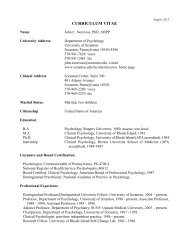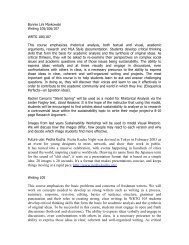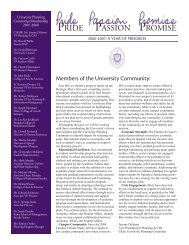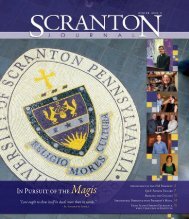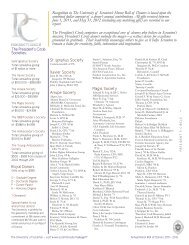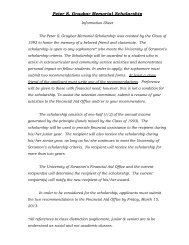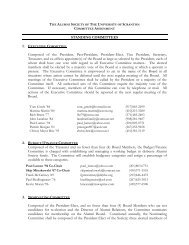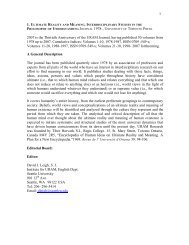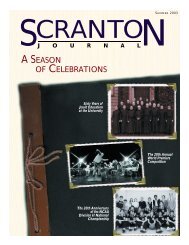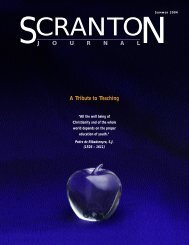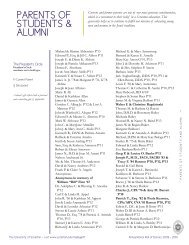MGT 351 - The University of Scranton
MGT 351 - The University of Scranton
MGT 351 - The University of Scranton
Create successful ePaper yourself
Turn your PDF publications into a flip-book with our unique Google optimized e-Paper software.
Sustainability Workshop 2008<br />
Including Sustainability in <strong>MGT</strong> <strong>351</strong><br />
Len Tischler<br />
<strong>MGT</strong> <strong>351</strong> is the first semester <strong>of</strong> Principles <strong>of</strong> Management. It is a survey course<br />
covering many topics. <strong>The</strong> main homework for the semester was weekly papers, one for each<br />
chapter, that asked the students, in teams, to create a local restaurant (on paper) and then to<br />
answer questions related to each chapter about that restaurant. For most chapters a question was<br />
included about social responsibility or sustainability. Each week we would discuss the students’<br />
answers to the questions in class. <strong>The</strong> intention was that by thinking about sustainability and<br />
social responsibility issues, students would learn their importance.<br />
I also had students watch four films and write reflections about them. <strong>The</strong> films focused<br />
on social responsibility and sustainability issues. One <strong>of</strong> the films, for example, was “An<br />
Inconvenient Truth.”<br />
This approach was successful and had problems. It was successful in that a majority <strong>of</strong><br />
students began to see that sustainability and social responsibility issues were part <strong>of</strong><br />
management’s (or owners’) responsibility. Unfortunately I also met some resistance. Some<br />
students didn’t understand what these questions have to do with running or managing a business.<br />
Even when they saw the connection, they felt that I inserted these questions too <strong>of</strong>ten. Perhaps<br />
half the time or two thirds <strong>of</strong> the time would have been enough. Perhaps also I should not have<br />
always had these as the last questions. It might have been better if I had them more embedded<br />
within the list <strong>of</strong> questions.<br />
Students liked the films. About half had already seen “An Inconvenient Truth” in other<br />
classes.<br />
SYLLABUS<br />
Mgt <strong>351</strong> Principles <strong>of</strong> Management I<br />
MWF 9:00-9:50am BRN 203<br />
Fall, 2007 Dr. Len Tischler<br />
Office Hours: MW 10-10:50, 2-2:50 or by appointment Brennan 344<br />
Communication: Office 941-7782 Home 504-5934 Fax 941-4826<br />
len.tischler@scranton.edu<br />
Assignment instructions and other documents will be posted on the Angel site.<br />
COURSE GOALS: This is the first semester <strong>of</strong> an introductory course that surveys the many<br />
learnings and insights gained over the past 100+ years about managing organizations, people,
and yourself. <strong>The</strong> first semester <strong>of</strong> this course focuses on management in general and its<br />
environment, on planning, decision-making, and organizing work, and on a few special areas.<br />
You will be writing papers, working in small groups, and participating in class<br />
discussions, all aimed at improving your communication skills (KSOM Learning Goal #1). You<br />
will be analyzing a particular business in depth from a number <strong>of</strong> angles, developing your critical<br />
thinking and decision-making skills (KSOM Learning Goal #2). We will discuss ethical, justice,<br />
and sustainability issues (KSOM Learning Goal #3). You will assess your business’s needed<br />
responses to changes in business conditions (KSOM Learning Goal #5).<br />
REQUIRED READINGS:<br />
Effective Management, Chuck Williams, 3rd Ed., 2008<br />
Videos and readings in the library or on the Web.<br />
GRADING:<br />
Class Participation 100 (volunteer substantive ideas and do team work<br />
effectively/enthusiastically)<br />
Business Project papers 600 (50 each)<br />
Papers on films, articles 200 (50 each)<br />
Teamwork papers 100<br />
Test 1 100<br />
Test 2 100<br />
TOTAL 1200<br />
Note: A student cannot get a good grade for class participation with poor attendance.<br />
A=1116-1200, A-=1080-1115, B+=1044-1079, B=996-1043, B-=960-995, C+=924-959,<br />
C=876-923, C-=840-875, D+=804-839, D=720-803, F
CLASS SCHEDULE<br />
NOTE: All assignments should be handed in for the day’s class on which they are noted. Typed<br />
is always preferred. For these and all other assignments, be ready to summarize and discuss<br />
them in class.<br />
*Along with reading each chapter,<br />
read the Management Decision case near the end <strong>of</strong> each chapter, try to answer the<br />
questions, and be ready to discuss the case, and<br />
take the self-assessment at the end <strong>of</strong> each chapter and read the scoring blurb about it<br />
online.<br />
*BP = Business Project assignments.<br />
DATE ASSIGNMENTS* – DUE DATES CLASS TOPICS or<br />
ACTIVITY<br />
Aug 27<br />
Introduction. What is<br />
Management? Why study it?<br />
Aug 29 Read syllabus, Business Project (BP) for<br />
Principles <strong>of</strong> Management. Choose a business.<br />
Choose teams, business. Using<br />
the text’s resources. Preview<br />
Chapter 1.<br />
*Turn in description <strong>of</strong><br />
business. Discuss Chapter 1.<br />
Aug 31 Read Chapter 1. Write a description <strong>of</strong> your<br />
chosen business.<br />
Sep 3 NO CLASS – LABOR DAY<br />
Sep 5 Do Chapter 1 BP assignment. *Turn in Chapter 1 BP<br />
assignment; discuss. Preview<br />
Chapter 2.<br />
Sep 7 Read Chapter 2 Discuss Chapter 2.<br />
Sep 10 Watch “<strong>The</strong> Corporation” video in the library.<br />
Write a 2-3 page paper about it.<br />
*Turn in paper. Discuss the<br />
film.<br />
Sep 12 Do Chapter 2 BP assignment. *Turn in Chapter 2 assignment;<br />
discuss.<br />
Sep 14 Teamwork assignment *Share your teamwork ideas.<br />
Sep 17 Write up a Teamwork Contract *Share and turn in your<br />
contract. Preview Chapter 3.<br />
Sep 19 Read Chapter 3 Discuss Chapter 3<br />
Sep 21 Go to Lecture Special Lecture: BRN 228.<br />
Ethics and Culture<br />
Sep 24 Do Chapter 3 BP assignment *Turn in Chapter 3 BP<br />
assignment; discuss. Preview<br />
Chapter 4.<br />
Sep 26 Read Chapter 4 Discuss Chapter 4<br />
Sep 28 Do Chapter 4 BP assignment *Turn in Chapter 4 BP<br />
assignment; discuss. Preview<br />
Chapter 5.<br />
Oct 1 Read Chapter 5 Discuss Chapter 5
Oct 3 Do Chapter 5 BP assignment *Turn in Chapter 5 BP<br />
assignment; discuss.<br />
Oct 5 Complete Team assessment #1. *Turn in Team assessment;<br />
class discussion about<br />
teamwork. ** Preview Chapter<br />
6.<br />
Oct 8 Read Chapter 6 Discuss Chapter 6<br />
Oct 10 Do Chapter 6 BP assignment *Turn in Chapter 6 BP<br />
assignment; discuss.<br />
Oct 12 Study for Test on Chaps 1-6 *Test<br />
Oct 15<br />
Oct 17<br />
NO CLASS – FALL BREAK<br />
Review Test. Preview Chapter<br />
7.<br />
Oct 19 Watch and write reflection on film. *Turn in paper on film.<br />
Discuss film.<br />
Oct 22 Read Chapter 7 Discuss Chapter 7.<br />
Oct 24 Do Chapter 7 BP assignment *Turn in Chapter 7 BP<br />
assignment; discuss. Preview<br />
Chapter 8.<br />
Oct 26 Read Chapter 8 Discuss Chapter 8<br />
Oct 29 Do Chapter 8 BP assignment *Turn in Chapter 8 BP<br />
assignment; discuss.<br />
Oct 31 NO CLASS<br />
Nov 2 NO CLASS<br />
Nov 5 Read Chapter 10 Discuss Chapter 10<br />
Nov 7 Do Chapter 10 BP assignment *Turn in Chapter 10 BP<br />
assignment; discuss.<br />
Nov 9 Complete Team assessment #2. *Turn in Team assessment;<br />
class discussion about<br />
teamwork. **<br />
Nov 12 Read Chapter 14 Discuss Chapter 14<br />
Nov 14 Do Chapter 14 BP assignment *Turn in Chapter 14 BP<br />
assignment; discuss.<br />
Nov 16<br />
Watch and write paper on “An Inconvenient<br />
Truth” film.<br />
*Turn in paper; discuss film’s<br />
theme in the context <strong>of</strong><br />
business.<br />
Nov 19 NO CLASS<br />
Nov 21 NO CLASS – THANKSGIVING<br />
Nov 210 NO CLASS – THANKSGIVING<br />
Nov 26 Read Chapter 15 Discuss Chapter 15<br />
Nov 28 Do Chapter 15 BP assignment *Turn in Chapter 15 BP<br />
assignment; discuss.<br />
Nov 30 Read and write paper on “<strong>The</strong> Tragedy <strong>of</strong> the<br />
Commons”***<br />
Dec 3 Read Chapter 16 Discuss Chapter 16<br />
*Turn in paper; discuss the<br />
tragedy <strong>of</strong> the commons.
Dec 5 Do Chapter 16 BP assignment *Turn in Chapter 16 BP<br />
assignment; discuss.<br />
Dec 7 Complete Team assessment #3. *Turn in Team assessment;<br />
class discussion about<br />
teamwork. **<br />
Dec 10<br />
Review <strong>of</strong> course.<br />
TBA Final Exam Final Exam<br />
* Many assignments will be given in class; you are responsible for them even if you are absent.<br />
Note: Attending class and turning in homework on time are treated similarly to how they would<br />
be treated in a pr<strong>of</strong>essional work environment: they are expected.<br />
**Team Assessments: See Team Assessment form below. Whenever a team seems to be having<br />
trouble, the pr<strong>of</strong>essor will ask the team to meet with him to discuss the issues. Grades for you<br />
team work will be partly based on the team’s grades and partly based on how well you did in<br />
your team: contribution and learning/use <strong>of</strong> new skills and roles.<br />
***”<strong>The</strong> Tragedy <strong>of</strong> the Commons”: the original article is on http://die<strong>of</strong>f.org/page95.htm, and a<br />
summary is on Wikipedia: http://en.wikipedia.org/wiki/Tragedy_<strong>of</strong>_the_commons. Read both.<br />
Extra credit can be earned for attending lectures related to management and writing a summary<br />
and reflection on what you learned. Extra credit can also be earned by reading substantive<br />
articles about management topics and writing a summary and reflection on what you learned.<br />
GENERAL CLASS STRUCTURE<br />
Classes will be highly interactive. <strong>The</strong>re will be a lot <strong>of</strong> teamwork in class and a continuing<br />
team project out <strong>of</strong> class. Much <strong>of</strong> the teamwork will be structured so that everyone has to come<br />
prepared or the team doesn’t gain points toward the team grade.<br />
STUDY HELP RESOURCES<br />
<strong>The</strong> text publisher provides many resources online. <strong>The</strong>y will be demonstrated during the seond<br />
class.
Assignment Notes<br />
Business Project assignments: (Group papers) Answer the questions, discuss the issues, or<br />
follow the directions for each assignment. Your papers should be no more than 5 pages long.<br />
<strong>The</strong>y will be graded according to the grading rubric supplied at the end <strong>of</strong> the assignment sheet.<br />
Teamwork assignment: Begin by reading pp. 253-265 and looking up “teamwork” on<br />
Wikipedia and following their links. <strong>The</strong>n reflect on classroom teams you’ve been on in the<br />
past: what worked well and what didn’t? Why? Now reflect on your experience so far in your<br />
team in this class. (You’ve already done two assignments together.) Write up the following:<br />
summarize what you have just learned,<br />
write down what grade you want to earn for your part <strong>of</strong> the group assignments for this<br />
class,<br />
write what “rules” your team “should” follow to be a high-performance team,<br />
write what team roles you have been good at playing in the past and would be willing to<br />
play with this team, and<br />
write what new team roles you would like to learn to play, or play better, and what team<br />
skills you would like to improve on during this course.<br />
Teamwork Contract: Based on the Teamwork assignment and on your discussions with your<br />
teammates, write up a simple contract in which you state that you agree to play certain roles and<br />
use certain skills in the team throughout the semester and identify which roles and skills you<br />
believe you are already good at and which you are trying to learn. Also state the minimum and<br />
maximum grade you are seeking for your participation in the team’s work.<br />
Team Assessment: Assess yourself and your teammates using the Team Assessment form<br />
below. Part <strong>of</strong> the work <strong>of</strong> a manager is assessing others at work; this is an opportunity to see<br />
how well you do with it and the struggles involved in assessment. This topic is introduced in<br />
Chapter 10 under “Performance Appraisal” (pp. 295-299).<br />
Papers on films & articles: (Individual papers) Discuss what you learned, what you agree and<br />
disagree with, and its implications about corporations or business for your generation. How<br />
would you expect corporations to change over the next 30-40 years? How “should” they change,<br />
if different than what you expect?
Team Assessment<br />
DISTRIBUTE POINTS: Please distribute 100 points among all <strong>of</strong> the team members including<br />
yourself. More points should indicate more contribution to the team’s effort and product. Contribution<br />
can be in many areas, e.g., ideas, organizing the work, doing quality work, or keeping the feeling tone<br />
good.<br />
____________ YOU ________________________ (your name)<br />
____________ _________________________________ (name)<br />
____________ _________________________________ (name)<br />
____________ _________________________________ (name)<br />
____________ _________________________________ (name)<br />
____100_____ TOTAL POINTS FOR TEAM<br />
GRADE SKILLS AND ROLES: For each skill and role below, grade each team member on their use <strong>of</strong><br />
the skill: combine the amount they attempted to play the role or use the skill with how well they did with<br />
it into a single grade on a scale <strong>of</strong> A, B, C, D, F – just like school grades. See descriptions at<br />
http://en.wikipedia.org/wiki/Teamwork.<br />
Name:<br />
Skill/Role<br />
Listening<br />
Questioning<br />
Persuading<br />
Respecting<br />
Helping<br />
Sharing<br />
Participating<br />
Communication<br />
Coordinator<br />
Shaper<br />
Plant<br />
Resource<br />
Investigator<br />
Implementer<br />
Team Worker<br />
Complmenter<br />
Monitor Evaluator<br />
Specialist<br />
Finisher<br />
You<br />
Overall, how is the team doing? Give it a grade (A to F) ___________________________<br />
Add any comments about your team:
Business Project for Principles <strong>of</strong> Management I<br />
Dr. Len Tischler Fall 2007<br />
NOTE: All assignments should be written with proper grammar and spelling, in business style, using business<br />
terminology, and using ideas and theories from the text and from class in a sophisticated manner. See the grading<br />
rubric below.<br />
Preliminaries:<br />
Form a team <strong>of</strong> four people.<br />
a. <strong>The</strong> most important criterion <strong>of</strong> a successful team is that it can meet – so make sure that there are 2<br />
blocks <strong>of</strong> time each week that everyone on the team can meet every week. (You won’t need both<br />
blocks most weeks, but it’s useful to have it available.)<br />
b. Preferably each team should have a diversity <strong>of</strong> majors on it –an accounting/finance person, a<br />
marketing person, a management person, etc.<br />
Choose a type <strong>of</strong> restaurant and a location for that restaurant. This will be your business for the semester. For<br />
example, choose a pizza take-out restaurant on Mulberry Street, or a fancy Italian restaurant (like Russell’s)<br />
downtown, or a sports bar/restaurant downtown, etc. You can choose any type <strong>of</strong> restaurant. <strong>The</strong> location<br />
should either be Mulberry Street or downtown <strong>Scranton</strong>.<br />
a. Using at least half a page, name and describe the restaurant – its type, size (e.g., seating capacity),<br />
location, and any other details that would clearly identify it.<br />
b. In another half page describe in general terms your restaurant’s potential impact on the community and<br />
its environment. How does it serve or hurt these environments?<br />
1. Assume one member <strong>of</strong> your team will be the general manager <strong>of</strong> the restaurant and another a shift manager. For<br />
each <strong>of</strong> the two positions answer the following questions:<br />
a. For each manager give an example <strong>of</strong> something they might plan, organize, lead & control. Show in a<br />
sentence or two that you understand each <strong>of</strong> the 4 management functions for each level <strong>of</strong> management.<br />
b. For each manager, give 2-3 examples each <strong>of</strong> their interpersonal, informational, and decisional roles.<br />
c. List 2-3 technical, interpersonal, and conceptual skills needed by each <strong>of</strong> these managers.<br />
d. What are the responsibilities <strong>of</strong> the two different managers toward the local community and its<br />
physical environment?<br />
2. Organizational Environments and Cultures<br />
a. Name all <strong>of</strong> the major parts <strong>of</strong> the restaurant’s general, specific, and internal environments that will<br />
likely have important impacts on the business – and discuss those impacts and how the restaurant<br />
should deal with them.<br />
b. How might each manager learn about changes in their environments?<br />
c. List the restaurant’s likely impacts on its various environments.<br />
3. Ethics and Social Responsibility<br />
a. What kind <strong>of</strong> ethical issues could arise in running your restaurant and how would you try to assure that<br />
everyone at the restaurant stays on the correct side <strong>of</strong> each issue? What is the correct side?<br />
b. Using the social responsibility scale below:<br />
i. In general how far to the right should your restaurant go? Why?<br />
ii. Give examples <strong>of</strong> social responsibility issues that your restaurant is likely to face and how you<br />
would handle them as owner/manager.<br />
Social Responsibility<br />
Economic Legal Ethical Discretionary
c. How might you handle ethical issues differently in different countries? Use Dr.<br />
Gannon’s speech to answer this.<br />
4. Planning & Decision-Making. For the overall restaurant manager and a shift manager (separately) name<br />
something important that each would plan for.<br />
a. Describe each <strong>of</strong> the steps you would take to decide what path to take to reach your objective. (Include<br />
presenting and choosing among alternative options.) (Use the decision-making part <strong>of</strong> the chapter.)<br />
b. For the particular issue/objective you chose, describe exactly how you would enact each step in the<br />
planning process to meet the objective.<br />
c. What internal and external stakeholders should be involved in the planning? In the implementation?<br />
Why? Name others who should not be involved and why?<br />
5. Organizational Strategy.<br />
a. Describe a sustainable competitive advantage you can create for your restaurant.<br />
b. What distinctive competence(s) or core capabilities does your restaurant have that other nearby<br />
restaurants don’t have – and that you can use to create your competitive advantage?<br />
c. What makes you believe that your competitive advantage will be sustainable for several years?<br />
d. Analyze your restaurant’s local industry in terms <strong>of</strong> the Five Industry Forces.<br />
e. Is your restaurant going to be a cost leader or a differentiator? Describe how you will accomplish your<br />
strategy.<br />
f. Will you take a defender, prospector, analyzer, or reactor stance toward strategy?<br />
g. How will you incorporate environmental and social sustainability into your strategic plan for the<br />
restaurant?<br />
6. Innovation and Change.<br />
a. Name some innovations in restaurants that have occurred over the past 10 years or so.<br />
b. Which <strong>of</strong> these will you incorporate in your restaurant and why?<br />
c. How will any <strong>of</strong> them help create competitive advantage?<br />
d. What kinds <strong>of</strong> innovations can you predict might come to restaurants in the next 10 years?<br />
e. Let’s say that your restaurant is running, you have a particular cash register system, and you want to<br />
install a new one with a new way <strong>of</strong> operating, new procedures to learn. How would you manage<br />
employees’ resistance to the change?<br />
f. Given the new technologies you listed in (a) above, which ones are eco-friendly and which aren’t, and<br />
how can you make some <strong>of</strong> them more eco-friendly?<br />
7. Global Management.<br />
a. List and explain all the ways that globalization might affect your restaurant.<br />
b. If your restaurant is very successful and you want to expand to another country,<br />
i. To what country would you expand and why? Answer in terms <strong>of</strong> the best business climate<br />
for your restaurant.<br />
ii. How would you go global? Using what form <strong>of</strong> global business?<br />
c. Describe how the cultural differences in the country <strong>of</strong> your choice might force you to change some <strong>of</strong><br />
the ways you operate the restaurant in the new country.<br />
d. Would you choose an American or a native <strong>of</strong> the other country to manage your new restaurant? Why<br />
this choice? Give pros and cons.<br />
e. Given the country you chose, how would you assure that you are not hurting the local society or<br />
environment?<br />
8. Designing Adaptive Organizations<br />
a. Back to one restaurant, how would you departmentalize the restaurant?<br />
b. Would this change if you owned another restaurant in another country? How? Why?<br />
c. Would it change if you owned 30 restaurants in 6 countries? How? Why?
d. Given one restaurant, draw an organizational chart showing the various positions in the restaurant in<br />
their proper hierarchy.<br />
e. How can you make this structure more flexible, adaptive?<br />
f. Discuss the jobs <strong>of</strong> a waitress and a cook (separately) in terms <strong>of</strong> job design issues.<br />
g. How and how much would you empower your wait staff?<br />
h. What sustainability issues are involved in designing your restaurant’s organizational structure and<br />
processes?<br />
10. Managing Human Resource Systems. Restaurants tend to have very high turnover and sometimes not very<br />
good productivity. Starbucks has become one <strong>of</strong> the leading companies in the way they treat their people.<br />
Look them up on the web as one way to help answer the following questions.<br />
a. How would you recruit and select so that your restaurant’s turnover is one <strong>of</strong> the best in the industry<br />
(without costing more)?<br />
b. How would you socialize, train, design the jobs, and appraise performance to keep employees satisfied,<br />
turnover low, and productivity high (without costing more)?<br />
c. Describe your compensation and career development approach for your various employees.<br />
d. Describe your group’s opinion about affirmative action.<br />
(For each <strong>of</strong> the above, describe whether your approach is universal [for all employees] or how it would be<br />
different for different positions.)<br />
e. If all companies followed your HR policies how would this impact society?<br />
14. Control.<br />
a. As a shift manager, what kind <strong>of</strong> control system would you want in place in your restaurant for your<br />
wait/counter and kitchen staff? What do you want to control and how would you control it?<br />
i. Name what you are trying to control. (see end <strong>of</strong> chapter)<br />
ii. Propose a standard or standards for it. Explain.<br />
iii. Decide whether to use feedback, concurrent or feedforward control. Explain your choice.<br />
iv. Decide what control method(s) to use. Explain why and how you would implement it.<br />
b. As the overall restaurant manager, choose something to control.<br />
i. Name what you are trying to control. (see end <strong>of</strong> chapter)<br />
ii. Propose a standard or standards for it. Explain.<br />
iii. Decide whether to use feedback, concurrent or feedforward control. Explain your choice.<br />
iv. Decide what control method(s) to use. Explain why and how you would implement it.<br />
c. How does each control method impact your people? Think in terms <strong>of</strong> social sustainability. How<br />
might this be different if you set up another restaurant in a poor Mexican village?<br />
15. Managing Information.<br />
a. Name the kinds <strong>of</strong> information that could be strategically useful for managing a restaurant. Describe<br />
how each would be useful.<br />
b. What kinds <strong>of</strong> information would be useful to capture within the restaurant? Explain each.<br />
c. Describe the best information systems you’ve seen in real restaurants. Why or why not would they be<br />
helpful in your restaurant? How can they help you strategically?<br />
d. How can they help you ecologically or socially?<br />
16. Managing Service and Manufacturing Operations<br />
a. How would you keep productivity high in your restaurant?<br />
b. How would you assure high quality, and name the areas <strong>of</strong> quality that are important in a restaurant.<br />
c. How would you create a culture <strong>of</strong> continuous improvement, and what would that look like in terms <strong>of</strong><br />
wait staff behaviors?<br />
d. How would a culture <strong>of</strong> continuous improvement improve your restaurant’s ecological footprint?
Scoring Rubric<br />
Business Project Assignments for Principles <strong>of</strong> Management I<br />
Dr. Len Tischler Fall 2007<br />
Team Members<br />
___________________________________<br />
___________________________________<br />
___________________________________<br />
___________________________________<br />
Chapter __________<br />
Grammar and<br />
spelling<br />
Business style and<br />
language<br />
How well does the<br />
work answer the<br />
questions?<br />
Points<br />
1-3 4-7 8-10 Total<br />
More than 3/page or Only a few errors. Perfect<br />
more than 10 errors<br />
combined<br />
Casual style with<br />
little business<br />
language.<br />
Doesn’t answer,<br />
only hints at an<br />
answer.<br />
Close to business<br />
style and language.<br />
Gives a good answer<br />
but misses some<br />
issues.<br />
Sophisticated<br />
business style and<br />
language.<br />
Accurate, clear<br />
answer.<br />
How complete is the<br />
answer?<br />
Incomplete.<br />
Some missing parts<br />
or aspects.<br />
Complete.<br />
General depth <strong>of</strong><br />
ideas & seriousness<br />
Last minute effort;<br />
dome to hand in.<br />
Some thinking and<br />
effort to understand.<br />
Deep and serious<br />
work.<br />
TOTAL<br />
Comments ____________________________________________________________________<br />
_____________________________________________________________________________<br />
_____________________________________________________________________________<br />
_____________________________________________________________________________<br />
____________________________________________________________________________



